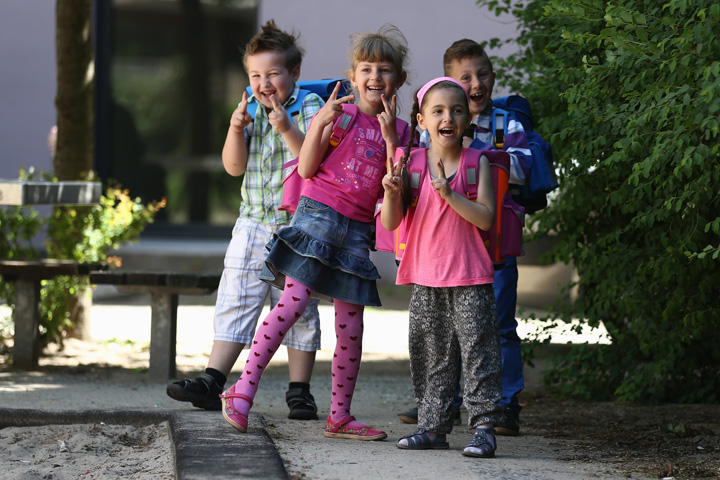TORONTO — The pressure is on for parents. The medical community has placed much emphasis on the first few years of a child’s life, warning that this critical phase holds the key to overall development through the rest of his or her lifespan.

Now, a large-scale study is even suggesting that a child’s temperament could help determine if he or she will face alcohol problems as a teenager.
Virginia Commonwealth University researchers studied more than 12,000 kids from six months to five years old then looked at their experience with alcohol by age 15.
It’s no coincidence that they chose to study their subjects at an early age.
“But people don’t enter adolescence as blank slates; they have a history of life experiences that they bring with them, dating back to early childhood,” Dick said.
Read more: Alcohol advertising linked to ‘increased’ drinking in adolescent girls, Canadian doctor warns
After looking at responses from kids and their parents, they found that two groups of toddlers were most vulnerable to alcohol issues later on in life: kids who showed consistent emotional and behavioural problems and kids who were consistently “sociable” at a very early age.
But it was the social butterfly kids who encountered drinking problems more as teens than the so-called “problem child,” Dick notes.
“This underscores the fact that drinking during adolescence is largely a social phenomenon,” she said.
Critical years in child development
A library of research points to the relationship between the first five years of life and its effect on adulthood.
“Brain and biological development during the first years of life is highly influenced by an infant’s environment. Early experiences determine health, education and economic participation for the rest of life,” the World Health Organization says on its website.
“It’s huge. Impulsivity will persist through life,” Dr. Oren Amitay, a clinical psychologist and Ryerson University professor, told Global News.
Read more: Preschoolers’ eating habits linked to future heart health risks, Canadian study suggests
He points to the famous Stanford marshmallow test in which kids are offered a choice between one treat or waiting for about 15 minutes to double their reward. Kids who were able to wait longer tended to have better life outcomes, the study had suggested.
With this in mind, he tells parents that a child’s first few years of life won’t set a life course that’s set in stone.
Parents, coaches and teachers along the way help mould kids’ beliefs and decision-making skills.
“There are dozens of other factors for each child that could help explain what would make a child, in this case, face drinking problems or not,” Amitay said.
Brain development and decision-making
Dr. Linda Pagani, a psychologist at St. Justine Hospital in Montreal, studies child development, specifically the brain.
In her research, she noted a link between impulsivity in five-year-olds and gambling as adolescents. In this case, those with less developed frontal lobe regions of the brain as five-year-olds tended to gamble more as 12-year-olds.
It may have been playing with Bingo or card games, but these preteens tended to take more risks or were more impulsive in their betting compared to their counterparts who didn’t face delays in development.
The frontal lobe of the brain is linked to decision-making.
Read more: Canadian study links secondhand smoke to childhood aggression
“It’s the processing of what is going on around you. It’s all registering, like a feedback loop that keeps trying to manage the input and the output. The output is behaviour, of course,” she explained.
With some similarities between the studies, she said she’s not surprised by the findings.
“We know that even in normal populations, impulsivity is associated with binge drinking. You don’t plan, you binge drink,” she said.
Parenting kids to help nurture structure, decision-making skills
Pagani advises parents to consider their child’s needs. She suggests parents can detect if their kids need more attention — they may be inattentive, impulsive or hard to please and soothe when upset.
“Children who are impulsive need strong parents with lots of leadership. Scientists have long established that good parenting is a nice dosage of affection and control,” she said. She suggests building structure into kids’ lives.
Amitay tells parents that they should brace themselves to understand that their kids may try alcohol.
The key is to teach kids about responsibility and repercussions that come along with their actions.
Read more: Sesame Street on incarceration: New Muppt with parent in jail gets mixed reviews
“Parents have to assume that there’s a high probability their kids are going to drink, parents have to assume they’re going to try drugs. The whole idea is a harm reduction model,” he told Global News.
“You don’t encourage it and you don’t glorify it, and you don’t tell them you know they’re going to do it. But you assume it’s going to happen and you try to make sure they do it responsibly,” Amitay said.
The Virginia Commonwealth University study will be published in December in the journal Alcoholism: Clinical and Experimental Research. As of Wednesday, it’s available as an early view online.
carmen.chai@globalnews.ca
Follow @Carmen_Chai




Comments